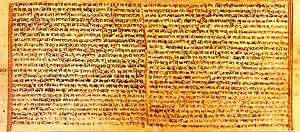Svetambar Terapanth

Terapanth is a religious sect of Śvētāmbara Jainism. It was founded by Muni Bhikhan (Bhikshu Swami), who later became Acharya Bhikshu. Bhikshu was originally a member of the Sthānakavāsī order and was initiated by Acharya Raghunatha. But he had differences with his guru on several aspects of religious practices of the Sthanakvasi order and left it. On Vikram Samvat 1817 (28 June 1760) at Kelwa, a small town in Udaipur district of Rajasthan state, he founded the new Śvētāmbara Terapanthi order.
The Terapanthi order is strongly aniconic and has lakhs of followers in many parts of the world.[1][2][3][4]
Bhikshu stressed 13 religious principles, namely, (i) five Mahavratas (great vows), (ii) five samitis (regulations) and (iii) three Guptis (controls or restraints). His order was therefore known as the Terapantha or "thirteen-panthan". He wrote his Letter of Conduct in Rajasthani and it remains the central organising doctrine of the Terapanthi. Bhikshu did tapasya in family house of Maniklalji Somavath in his last breath at Siriyari Rajasthan. Somavatha family retains the place even today.
The practice of one leader regulating the entire order is a unique feature Terapanthi Jainism. The current leader is the eleventh, Acharya Mahasharman.
The Terapantha regularly observes a festival known as Maryada Mahotasava "Festival of Conduct". This distinctive festival is celebrated every year on the 7th day of the bright half of the month of Magha by ascetics and śrāvakas (layfolk).
References
- Shashi, S. S. Encyclopaedia Indica: India, Pakistan, Bangladesh. Origin and development of Indus civilization (Volume 1). Anmol Publications. ISBN 81-7041-859-3.
- Singh, Narendra (2001). "Acahrya Bhikshu and Terapanth". Encyclopaedia of Jainism. Anmol Publications. ISBN 81-261-0691-3.
- Dundas, Paul (2002). The Jains. Routledge. ISBN 0-415-26606-8.
- Vallely, Anne (2002). Guardians of the transcendent: an ethnography of a Jain ascetic community. University of Toronto Press. ISBN 0-8020-8415-X.
- Flügel, Peter (2002) 'Terapanth Svetambara Jain Tradition.' In: Melton, J.G. and Baumann, G., (eds.), Religions of the World: A Comprehensive Encyclopedia of Beliefs and Practices. Santa Barbara: ABC-Clio, pp. 1266-1267.
| ||||||||||||||||||||||||||||||||||||||||||||||||||||||||||||||||||||||